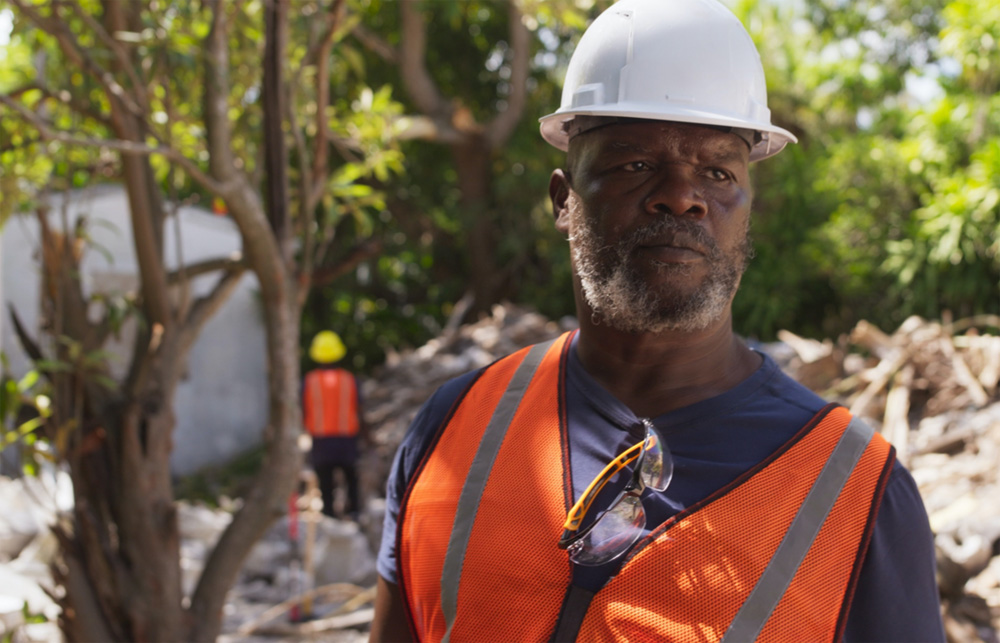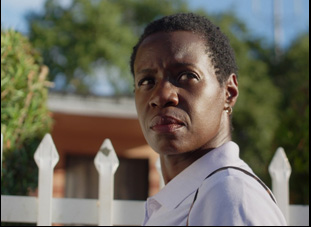The movie gods had larger plans for Monica Sorelle than she had for herself. A creative producer on other people’s projects, she was more than happy to corral resources to fulfill a director’s vision without thinking she could be one, not even taking it too seriously when she made the pitch for what would become her first feature to her writing and producing partner Robert Colom that with all the gentrification going on in her native Miami, it would be funny to tell a story about a demolition worker whose own home was under threat. Colom recognized the genius of the premise right away, and as it happened Oolite Arts, a nonprofit dedicated to the visual arts was in the midst of grant applications, eventually affording Sorelle the opportunity to bring what the city was now looking like to her on the screen. In the last few months, it’s taken her around the world.
“To be honest, I never expected to go to TIFF,” Sorelle told me as we were sitting in the Royal York Hotel in Toronto during the festival. “I thought maybe I would make this short, this little feature and it would go to maybe some regional fest and make a little bit of noise, but I didn’t think this would happen. That made it easier to [think], “Yeah, this is like a small investment, no big deal. This is just practice.” And it obviously turned into something much bigger and and when this opportunity with Oolite was presented to us, I think not only did it validate this idea that we had, but it also made me feel validated as someone that can step out from producing the film into actually being the driving visionary force.”
In what is now looking like the feature directorial debut of the year and surely one of the most exciting in recent memory, Sorelle tells a story of dreams in “Mountains” while achieving her own, dipping into the life of Xavier (Atibon Nazaire), his wife Esperance (Sheila Anozier) and their adult son Junior (Chris Renois), all living on the edge of Little Haiti where the family resettled from the motherland. The three don’t appear to need much more than they have in a humble home filled with love, but Xavier would love a more spacious place where Esperance could have a room to herself to knit in and as he’s tasked with taking down buildings, he’s been steadily tucking away the money to put a down payment on a bigger abode down the street. Still, redevelopment in the area is a mixed blessing at best when Xavier has no shortage of work, but increasingly less and less of a place to put down roots and complicating matters is how his vision for the family, expected to be the dominant one just as his role within it as its chief breadwinner is, may not align with either how Esperance or Junior, who grown up entirely in America, see their futures.
If the realization that Little Haiti is disappearing only slowly creeps up on Xavier, Sorelle makes sure one feels the enormity of what’s being lost as the beauty of the community is on full display and “Mountains” adopts an unconventional yet bewitching structure which allows the city to be seen from the perspective of all three of its main characters, sinking into their experience as if it were a warm bath. The film is refreshing in how it takes its time, but also the gentle electrical current that runs throughout as it presents the dichotomies both within the family and in their larger community that often go unreconciled until it feels too late and at once, “Mountains” can feel relaxed but urgent, conscious of where the drama is in places that often are overlooked. Since premiering at Tribeca earlier this year, the film has become a major find for audiences itself and is set for discovery this week at Indie Memphis and AFI Fest in L.A. where Sorelle and Colom will appear with the film, but before that, the director was gracious enough to talk about how she found her home in the director’s chair, incorporating real demolition work into the shoot and breaking down traditional narrative structures to make something that feels so invigorating with her first feature.
I spent a lot of time in Little Haiti when I was a child. That’s where my mother landed when she came to America and where she worked. She’s a single mother, so I would spend a lot of my days off from school in Little Haiti. After I left to film school and I came back in 2014, I started realizing things were off. Prior to moving back, I saw this film “Right to Wynwood,” about how developers targeted this Puerto Rican neighborhood for an arts district and utilized the methods of redeveloping this neighborhood and removing the Puerto Rican citizens that live there. So I had an inkling this is what’s going to happen in Little Haiti and I started getting involved with activism and trying to be a community organizer. But I realized that was not my gift. I was too shy, too sensitive, and I had always turned back to film, so [I thought] how can I amplify this and warn not just the citizens [of Little Haiti], but all these other ethnic enclaves in Miami?
Finally in 2018, this organization called Oolite Arts started a grant called the Cinematic Arts Residency and they wanted to just start a feature film ecosystem in Miami. We had been making a lot of shorts that would be in Sundance and Berlin, but collectively Miami filmmakers were not making features and this was a way to get us on that path. We were actually working in Wynwood and at that time, houses were being demolished every day. I would watch actual families live in the houses [where] a sticker [was affixed] on their door to be demolished to it being turned into a parking lot. This was daily, and when we were walking to lunch one day, I saw a demolition worker say goodbye to his co-workers and start to cross the street to the more suburban side of Wynwood where there’s still a Puerto Rican population and I turned to Robert and pitched as a joke, “a demolition worker lives so close to home that he could walk to and from work and is demolishing his neighborhood.” And Robert looked at me and [said seriously], “Okay, we’re doing that.” We pulled an all-nighter and we were like the last application in to this residency, but we were one of the first chosen.
I’m jumping ahead, but I’ve been dying to ask since I first saw it – did you build your schedule around actual demolitions? How did you get to create scenes where your characters interacted with them?
That was really tough. At first, we wanted to do all the demolitions in the first week, and we had some scouts at demolition sites, [and we were] actively talking to companies, but it was so difficult. Two weeks before shooting, nothing was locked. Then we started shooting, and we had these actors on hold, and towards the third week of shooting, we still didn’t have locations, so we thought that we would just shoot everything without the demolition, take a break, fly Atibon [Nazaire] back, and we’d just split this shoot into two different shoots. But Robert, my producer, somehow made a phone call one week before we had to shoot all the demolition scenes and he got three sites that were gonna be demolished concurrently in a four- day span, so while I was shooting on set, he was doing Zoom castings, and then he would bring me the videos at lunch and say, “Which one, which one, which one?” We turned that around in a matter of a couple of days, getting all those demolition sites and that was with the participation of two different demolition companies that allowed us free range — obviously with safety parameters — onto their demolition site.
Were you able to work with the community that was there? This has that feel.
To some degree. All the characters are based on someone or is like a amalgamation of a few people. And in terms of production, we did a lot of on the ground community outreach, so the houses we shot at, for example, It was just knocking on doors. That whole block [the family lives on] was people that helped support the film. They let us eat lunch in their yard. They let us use a room in their house to shoot in. They were our extras. There was one day that there was the house across the street from where we were shooting and they’re having a really loud conversation and they let us run over and record their conversation. As soon as we told people what we were [doing], the people that we engaged in the community were nothing but supportive and game to not only appear but also give us resources as we shot.
Was there anything you wanted to capture about the spirit of the place? Even if the establishing shots, nothing feels random.
I was interested in the architecture and how colorful Little Haiti is, which is why I think in contrast, I was really focused on the color white. When we think about Xavier’s Dream House, it was just this stark white color that just didn’t match the rest of the neighborhood. Or when we even go to like Junior’s job, it’s in this very white [space] or when we go to Miami Beach, everything’s white. You lose all the color. I think that’s like an alarm sounding, like when you start to see the colors start to get washed away in a neighborhood, you know that something’s coming. Besides that, I was just interested in making sure I got that rara [music that’s played as part of festivals]. That was also a bit of luck that it was our first time day of shooting and there was like a huge rara that was going to come [through the street] after this concert in Little Haiti, so we were just talking to the band and we were able to to film them and collaborate with them, which was super important to me because that singularly a Little Haiti experience. As things like that start to dwindle out of the neighborhood as things are changing, I just wanted to make sure that that was immortalized in cinema.

I’m so lucky. With Atibon, it was an accident. We didn’t do an open call because I thought it would be a waste of time to try to find a middle-aged Haitian man that would give us five weeks of his life in Miami, so we just scrubbed through all these Haitian movies and Atibon appeared with this quiet, cool and calm power whenever he spoke. He’s just such a captivating person and luckily, I did my research on Facebook and saw that he was friends with another Haitian filmmaker that was in town for the Miami Film Fest, so we went to the party and we name dropped like, “Oh, we’re thinking about Atibon.” And she’s like, “That’s my best friend. I’m going to give you his number right now.” And once we met him, we didn’t audition anyone else. That was it. It was almost like he was the only option.
Whereas Sheila [Anozier], who plays Esperance, I went to a Leyla McCalla concert in Miami that my friend was the director of and Sheila appeared as a dancer, and I remember [thinking], she looks like she would be really good for the role just by the looks of her,” but obviously in my head, [I thought] she’s not an actress. She was so warm and stunning, and obviously radiant, that I thought that’s exactly the person I wanted. She’s never acted before, but once we did the zoom, she’s so natural and we were just very lucky to find her.
Then Chris [Renois] I found on TikTok. He just came to me in the form of a viral video, and I wrote his name down and then when it came to time for casting, I was like, “Oh yeah, this guy.” And once we started auditioning him, he turned on his Zoom and he was like standing [poised] versus some of the other people who were auditioning that would hold their phone in the car. They were just very nonchalant about it. But Chris was off book, standing up, ready to go, so passionate, so ready, so hungry for the opportunity. And I always wanted a comedian [for that role], and he’d never acted before, but he had such a kinship with the character. I think the first thing he told me was, it feels like you guys are following me ’cause everything you wrote in the description this character is me and what I’m currently going through right now in terms of university and in terms of my father, so finding these three people separately felt really magical. They all had something very specific about them that fit the role exactly in what we set out to achieve.
I deeply love the structure of this where you feel like you’re breaking away from the story to follow each of the family members in their regular routine and at the same time, it all feeds into where you’re going with it. Was it tough to crack?
We wrote the script in 2019, and it’s such a blur. It was about a year of our life that we went into talking, researching, watching references, and building this arc. And the script [ultimately] was less than 50 pages. We had always left it open for the actors to bring themselves into it and to build upon the story with me. So I wanted it to be a very collaborative exercise between us. I felt knowing that I probably would have to hire non-actors, if I broke down every single line that I would maybe get stale performances, so this has always been a collaborative writing process between the actors — and not just the three main ones, but all of them — and myself. And especially in rehearsals, once they got to meet and create the characters together and with me, that definitely gave us a clearer picture into this imagined history of this family.
But I think I knew that I didn’t want to create a standard American indie. That was always something that we said. We would like a Caribbean tale, so that means that we would like take our time with it, we would sit in moments. In the very beginning, I [thought] I want to stop the story and go to a party because I just want to live in a Haitian family party so that people understand what our culture is, and what we eat, and what we gossip about, and who we are. In terms of leaving Xavier and following Esperance and Junior, that started because I just wanted to make sure that these people were more than just supporting characters that only appeared when they needed to service Xavier. That was something that I was so afraid of. I just wanted to flesh them out and think about, for example, a Haitian woman’s role in the house. I wanted you to see all the things on her plate every day and how she balances them with grace and how she really is the foundation and the grounding force of this family. She has two jobs and she’s doing laundry and she’s making dinner and I thought, what better way to do that than to just stop, let Xavier go to work, and then instead of the usual [plot machinations], the camera follows her to work for the day.
We also got the criticism in an early draft that people wanted more Junior, so in the same way that we follow Esperance, we [thought we] can do the same with Junior and as we follow her day, we follow his night. It was just a way to make sure these were well-rounded characters.
There’s this beautiful, gentle persistence in how it moves. What was it like to find the rhythm for this narratively?
My editor is Jonathan Cuartas, who is also a writer/director mainly for genre films, and if you watch his film “My Heart Can’t Beat Unless You Tell It To,” even though it’s a horror film, it also is this three-hander with siblings.
They’re just vampires…
Yeah, no big deal. But it’s also about these undertones of social issues, and he just has a very innate sense of what the rhythm of the film should be, and where it can slow down, and when we have to pick it up again. That was one of my favorite collaborations. I know a lot of filmmakers get really stressed out in the edit, but I actually was relieved that I had this collaborator that really understood. He’s also from Miami and he’s Colombian, so from a cultural standpoint, he understood the need to take our time and to really let our bodies breathe and he was able to tell me, “This works, let’s go for it” or “this doesn’t work, let’s pull back” and “how about this instead?” So all my props to Jonathan for being on the same page with me in terms of how I wanted to present this film as a true slice of life.
What’s it been like to get this out into the world?
This wasn’t something that I expected out of this. I’ve been to festivals before with shorts. This was just a little story we wanted to tell. No stars in it. Very much grounded in Miami, very much rooted in the Haitian culture and the Haitian language, so I didn’t know there would be an audience for this, even though I always thought we were talking about very universal themes. So to be selected at Tribeca and get the response we did really floored me. It’s just beautiful to know that even though it’s a very specific story about a very specific family and a very specific neighborhood of a very specific culture, people see themselves, their families, their neighborhoods and their issues. I’ve seen a review where people see themselves as the white girl with the dog walking by and that causes them to reflect. So I thought we held a huge mirror up and that Miami would be seeing themselves back, but we’ve come to realize that everyone is reflecting on themselves through the film in a way that I don’t think we would have ever anticipated. And my favorite part of this are the Q and As. I just love connecting with people and realizing that everything that we wanted to get across gets across clearly and that we were able to tell a story that is very rooted in this sort of violence that’s happening in terms of housing in this country, but that there’s still joy that we can find in it and through it.
“Mountains” will screen at AFI Fest in Los Angeles on October 27th at 1:40 pm at the Chinese 2 and October 29th at 11 am at the Chinese 4. It will screen at Indie Memphis on October 28th at 3:30 pm at Studio on the Square.





